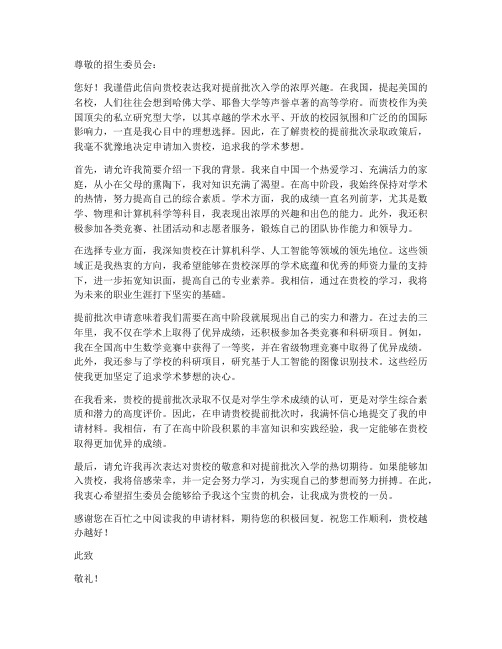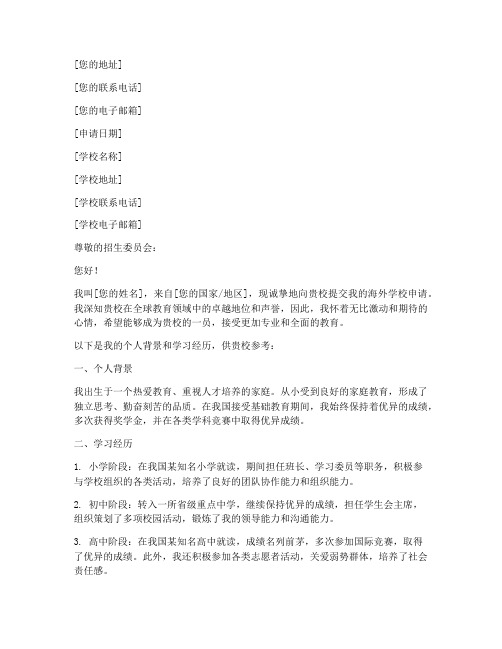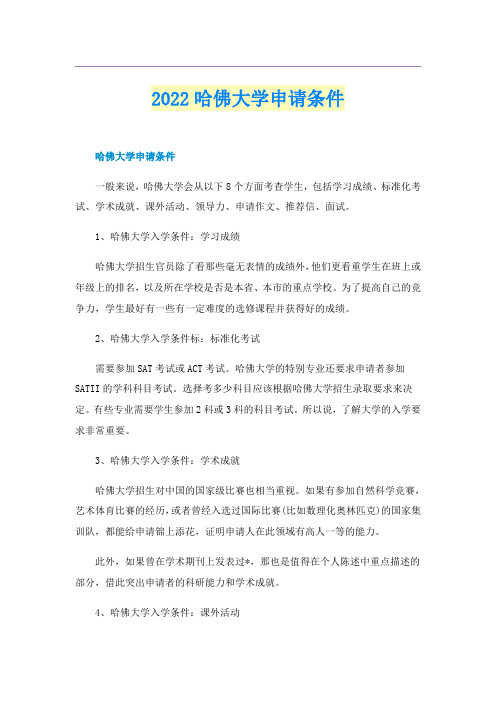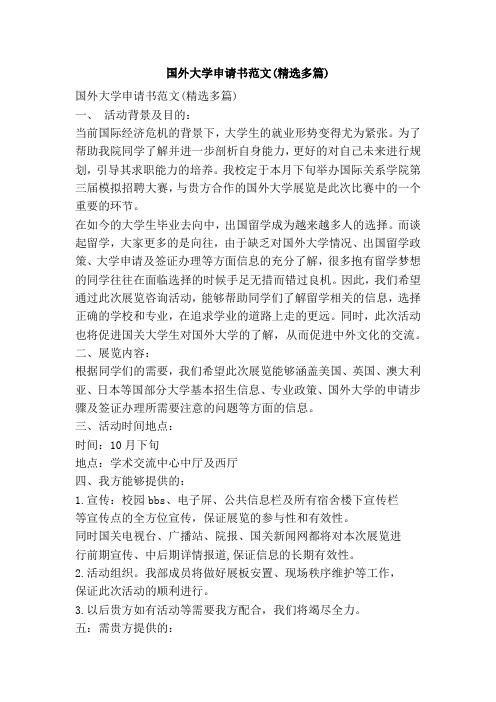哈佛大学申请书
哈佛大学研究生申请书

哈佛大学研究生申请书
尊敬的哈佛大学研究生招生委员会:
我衷心申请哈佛大学XXX项目的研究生入学资格。
在此,我想介绍一下自己的学术背景、研究经历、个人特质以及未来的学术目标。
首先,我本科毕业于XXX大学XXX专业,获得学士学位。
在本科阶段,我学习了许多基础课程,如XXX等,奠定了扎实的学术基础。
在大学期间,我积极参与科研项目,并发表了若干篇论文,这为我未来的学术生涯打下了坚实基础。
此外,我曾在XXX实验室进行研究项目,主要研究XXX领域。
通过这项研究,我不仅学到了许多专业知识,也掌握了一系列研究方法和技巧。
我热爱研究,喜欢通过科学的方法解决问题,这让我更加坚定了继续深造的决心。
在个人特质方面,我具有良好的团队合作能力、较强的逻辑思维能力和学习能力。
我善于与他人合作,能够有效沟通,协调团队成员的工作,共同完成研究任务。
我也能够迅速学习新知识,灵活应用,并不断提升自己的专业水平。
未来,我的学术目标是继续深造,不断提升自己的研究能力和学术水平。
我希望能够在XXX领域深入研究,推动学科的发展,为社会做出更多的贡献。
我相信,哈佛大学XXX项目将是我实现学术梦想的最佳选择,我愿意努力学习,积极参与各项活动,为项目的发展贡献自己的力量。
最后,衷心希望能够获得哈佛大学XXX项目的研究生入学资格,我将珍惜这个机会,努力学习,不负学校对我的期望。
期待未来在哈佛大学XXX项目继续深造,共同成长。
谨代表申请人
XXX
致谢!。
美国本科提前批申请书模板

尊敬的招生委员会:您好!我谨借此信向贵校表达我对提前批次入学的浓厚兴趣。
在我国,提起美国的名校,人们往往会想到哈佛大学、耶鲁大学等声誉卓著的高等学府。
而贵校作为美国顶尖的私立研究型大学,以其卓越的学术水平、开放的校园氛围和广泛的的国际影响力,一直是我心目中的理想选择。
因此,在了解贵校的提前批次录取政策后,我毫不犹豫地决定申请加入贵校,追求我的学术梦想。
首先,请允许我简要介绍一下我的背景。
我来自中国一个热爱学习、充满活力的家庭,从小在父母的熏陶下,我对知识充满了渴望。
在高中阶段,我始终保持对学术的热情,努力提高自己的综合素质。
学术方面,我的成绩一直名列前茅,尤其是数学、物理和计算机科学等科目,我表现出浓厚的兴趣和出色的能力。
此外,我还积极参加各类竞赛、社团活动和志愿者服务,锻炼自己的团队协作能力和领导力。
在选择专业方面,我深知贵校在计算机科学、人工智能等领域的领先地位。
这些领域正是我热衷的方向,我希望能够在贵校深厚的学术底蕴和优秀的师资力量的支持下,进一步拓宽知识面,提高自己的专业素养。
我相信,通过在贵校的学习,我将为未来的职业生涯打下坚实的基础。
提前批次申请意味着我们需要在高中阶段就展现出自己的实力和潜力。
在过去的三年里,我不仅在学术上取得了优异成绩,还积极参加各类竞赛和科研项目。
例如,我在全国高中生数学竞赛中获得了一等奖,并在省级物理竞赛中取得了优异成绩。
此外,我还参与了学校的科研项目,研究基于人工智能的图像识别技术。
这些经历使我更加坚定了追求学术梦想的决心。
在我看来,贵校的提前批次录取不仅是对学生学术成绩的认可,更是对学生综合素质和潜力的高度评价。
因此,在申请贵校提前批次时,我满怀信心地提交了我的申请材料。
我相信,有了在高中阶段积累的丰富知识和实践经验,我一定能够在贵校取得更加优异的成绩。
最后,请允许我再次表达对贵校的敬意和对提前批次入学的热切期待。
如果能够加入贵校,我将倍感荣幸,并一定会努力学习,为实现自己的梦想而努力拼搏。
海外学校申请书

[您的地址][您的联系电话][您的电子邮箱][申请日期][学校名称][学校地址][学校联系电话][学校电子邮箱]尊敬的招生委员会:您好!我叫[您的姓名],来自[您的国家/地区],现诚挚地向贵校提交我的海外学校申请。
我深知贵校在全球教育领域中的卓越地位和声誉,因此,我怀着无比激动和期待的心情,希望能够成为贵校的一员,接受更加专业和全面的教育。
以下是我的个人背景和学习经历,供贵校参考:一、个人背景我出生于一个热爱教育、重视人才培养的家庭。
从小受到良好的家庭教育,形成了独立思考、勤奋刻苦的品质。
在我国接受基础教育期间,我始终保持着优异的成绩,多次获得奖学金,并在各类学科竞赛中取得优异成绩。
二、学习经历1. 小学阶段:在我国某知名小学就读,期间担任班长、学习委员等职务,积极参与学校组织的各类活动,培养了良好的团队协作能力和组织能力。
2. 初中阶段:转入一所省级重点中学,继续保持优异的成绩,担任学生会主席,组织策划了多项校园活动,锻炼了我的领导能力和沟通能力。
3. 高中阶段:在我国某知名高中就读,成绩名列前茅,多次参加国际竞赛,取得了优异的成绩。
此外,我还积极参加各类志愿者活动,关爱弱势群体,培养了社会责任感。
4. 大学阶段:目前在我国某知名大学就读,专业为[您的专业]。
在大学期间,我积极参加各类学术研究和实践活动,不断提升自己的综合素质。
三、选择贵校的原因1. 贵校在国际上的声誉和地位:贵校作为全球知名的高等学府,拥有一流的师资力量和教学设施,为学生提供了优越的学习环境。
2. 贵校的专业优势:我所申请的专业在贵校具有很高的声誉,师资力量雄厚,课程设置合理,有助于我发挥自己的专业特长。
3. 贵校的教育理念:贵校秉持“以人为本、全面发展”的教育理念,注重培养学生的创新能力和实践能力,这与我的教育观念不谋而合。
四、个人规划进入贵校后,我将继续努力学习,不断提升自己的专业素养。
在学术研究方面,我希望能够参与导师的科研项目,发表学术论文;在实践能力方面,我希望能够参加各类实践活动,拓宽自己的视野。
2022哈佛大学申请条件

2022哈佛大学申请条件哈佛大学申请条件一般来说,哈佛大学会从以下8个方面考查学生,包括学习成绩、标准化考试、学术成就、课外活动、领导力、申请作文、推荐信、面试。
1、哈佛大学入学条件:学习成绩哈佛大学招生官员除了看那些毫无表情的成绩外,他们更看重学生在班上或年级上的排名,以及所在学校是否是本省、本市的重点学校。
为了提高自己的竞争力,学生最好有一些有一定难度的选修课程并获得好的成绩。
2、哈佛大学入学条件标:标准化考试需要参加SAT考试或ACT考试。
哈佛大学的特别专业还要求申请者参加SATII的学科科目考试。
选择考多少科目应该根据哈佛大学招生录取要求来决定。
有些专业需要学生参加2科或3科的科目考试。
所以说,了解大学的入学要求非常重要。
3、哈佛大学入学条件:学术成就哈佛大学招生对中国的国家级比赛也相当重视。
如果有参加自然科学竞赛,艺术体育比赛的经历,或者曾经入选过国际比赛(比如数理化奥林匹克)的国家集训队,都能给申请锦上添花,证明申请人在此领域有高人一等的能力。
此外,如果曾在学术期刊上发表过*,那也是值得在个人陈述中重点描述的部分,借此突出申请者的科研能力和学术成就。
4、哈佛大学入学条件:课外活动除了在课堂上的表现外,哈佛大学招生官员还希望了解你如何度过自己的课余生活?你对什么活动感兴趣?在活动中你如何与同学相处?你是否积极参加社区服务和志愿者活动?其实参加活动的多少、或者参加什么活动不重要。
5、哈佛大学入学条件:申请作文申请作文在申请过程中的重要性显而易见。
除了众所周知的个人陈述之外,你可能被要求就某个特定的问题(比如你最崇拜的人,你生活中遇到的某个窘境和你的对策等)撰写一篇有字数限制的*。
这个时候不要害怕袒露自己的心声,如果什么东西对你来说是真正重要的,谈论这样的事情,因为这正是录取人员希望了解的。
但这样重要的事情应该是正面的,反映你的经历和收获,它们如何改变了你,你从中学到了什么?6、哈佛大学入学条件:推荐信通常学校会要求你提供至少两封推荐信,因为他们希望了解别人眼中的你,特别是导师对你的评价。
国外大学申请书范文中文

国外大学申请书范文中文尊敬的招生官:首先,我衷心感谢贵校提供给我撰写这封申请书的机会。
我是一名对于学术追求充满热忱的学子,希望能够加入贵校的国际学生群体,迎接更广阔的知识和人生挑战。
我对于贵校声誉卓著的学术环境和多元化的文化氛围深感钦佩。
作为一所世界级的学府,贵校提供的教学资源和研究机会无疑能够使我在学术方面获得进一步的发展。
我期待着在这个充满创新与挑战的环境中发现自己更大的潜力。
关于我的背景和学术兴趣,我在此简要予以说明。
我毕业于中国某一所知名大学,取得了[学士/硕士/博士]学位。
在大学期间,我专注于[学科领域]的学习和研究,并取得了优秀的成绩。
我非常喜欢这个领域,并有着坚定的信念和热情,希望能够在您的大学中深入学习和探索。
在我的学术生涯中,我积极参与了实践和科研活动。
我曾在[实验室/研究机构]中担任研究助理,并参与了[项目名称]等重要研究项目。
通过这些实践经历,我不仅提高了自己的动手能力和实验技术,也培养了独立思考和解决问题的能力。
这些经验使我逐渐明确了自己的学术方向和研究兴趣,希望在贵校能够继续深化自己的学术专长。
除了学术能力,我也注重培养自己的综合素质。
我积极参加社团活动,并担任过[职位名称]的职务。
这些经历不仅让我锻炼了自己的组织能力和沟通能力,也培养了我团队合作精神和领导才能。
我相信这些优势能够使我在学术和社会层面都能够取得更好的成就。
最后,我希望通过加入贵校的学术社区,与世界各地的优秀学生共同学习和交流,互相激发出更多的创新思维和合作可能。
我深感自己与贵校的价值观和学术理念高度契合,我相信我将尽最大努力为贵校的学术繁荣和国际化发展做出贡献。
衷心祝愿贵校在未来的发展中蓬勃兴旺,期待能够获得您的肯定和宝贵的指导。
此致敬礼,[您的姓名]。
美国大学研究生申请书

美国大学研究生申请书尊敬的招生委员会:我写这封信是为了向贵校的神经科学研究生项目申请。
我是一名来自中国的学生,我对神经科学领域有着浓厚的兴趣,并希望能够在贵校深造。
我相信贵校的卓越教学和先进设施将会为我提供一个丰富的学习环境,帮助我实现我的职业目标。
我本科毕业于中国的一所知名大学,主修生物学专业。
在大学期间,我积极参与了多个神经科学领域的研究项目,包括如何在实验室中培养神经细胞和如何使用脑电图等技术来研究大脑活动。
这些项目不仅增强了我的实践能力,还让我对神经科学领域的研究产生了浓厚的兴趣。
在追求神经科学研究的过程中,我意识到了这个领域的重要性和复杂性。
神经科学涉及到大脑和神经系统的各个方面,如感知、学习、记忆、运动等。
我希望能够在研究生阶段进一步深入了解这些领域,探寻更多的未知领域,提升自己的研究能力。
我选择贵校是因为贵校在神经科学领域拥有丰富的资源和优秀的教师团队。
我深信在这样的学习环境中,我将不断学习和成长,实现我的梦想。
我希望能够在贵校的实验室中开展自己的研究项目,与其他研究生一起讨论,互相学习,共同进步。
在未来的职业生涯中,我希望能够成为一名优秀的神经科学家,为人类的健康和福祉做出自己的贡献。
我相信通过在贵校的学习和研究,我将能够达到这个目标。
我将会全力以赴,努力学习,不辜负贵校对我的信任和期望。
最后,我希望贵校能够给我一个展示自己的机会,让我展示自己的潜力和能力。
我相信在贵校的指导下,我将成为一名出色的神经科学研究生。
我期待着能够在贵校的校园里开启我人生的新篇章。
谢谢您花时间阅读我的申请信,期待能够得到您的回复。
真诚地,XXX。
美国学校申请书格式范文

[您的地址][城市,州,邮编][您的电话号码][您的电子邮箱][日期][招生办公室收件人姓名][学校名称][学校地址][城市,州,邮编]尊敬的招生办公室:主题:申请[学校名称]的[学位/课程名称]首先,请允许我向您表达我对[学校名称]的浓厚兴趣。
在深入了解贵校的教育理念、学术成就以及校园文化后,我坚信[学校名称]是我实现学术和职业目标的理想场所。
以下是我的个人背景、学术成就、课外活动和申请理由的详细介绍。
一、个人背景我出生并成长于[您的出生地],从小受到良好的家庭教育,培养了我独立、自律和积极向上的品质。
在[您的中学名称]就读期间,我不仅注重学术成绩,还积极参加各类课外活动,锻炼了我的团队合作能力和领导力。
二、学术成就在学术方面,我一直保持着优异的成绩。
在高中三年中,我的平均成绩为[您的平均成绩],排名班级前[您的排名]。
在[您的科目]方面,我取得了[您的成绩]的好成绩,这得益于我对这门学科的热爱和不懈努力。
此外,我还参加了[竞赛名称]竞赛,并获得了[奖项]。
三、课外活动在课外活动中,我积极参与了[社团名称]社团,担任了[职务],负责组织策划了[活动名称]活动。
在此过程中,我锻炼了自己的组织协调能力和沟通能力。
此外,我还参加了[志愿者活动名称],为社区做出了自己的贡献。
四、申请理由选择申请[学校名称],主要有以下原因:1. 学术资源:[学校名称]在[相关学科]领域享有盛誉,拥有一流的师资力量和丰富的学术资源,这为我提供了广阔的学术发展空间。
2. 教育理念:[学校名称]秉持着[学校的教育理念],注重培养学生的综合素质,这与我的教育理念不谋而合。
3. 校园文化:[学校名称]的校园文化充满活力,各类社团活动丰富多彩,有利于我拓展人际关系,提升自己的综合素质。
4. 地理位置:[学校名称]位于[城市名称],交通便利,生活设施完善,有利于我更好地融入校园生活。
总之,我相信在[学校名称]的学习生活中,我能够充分发挥自己的优势,实现个人价值。
国外大学申请书范文(精选多篇)

国外大学申请书范文(精选多篇)国外大学申请书范文(精选多篇)一、活动背景及目的:当前国际经济危机的背景下,大学生的就业形势变得尤为紧张。
为了帮助我院同学了解并进一步剖析自身能力,更好的对自己未来进行规划,引导其求职能力的培养。
我校定于本月下旬举办国际关系学院第三届模拟招聘大赛,与贵方合作的国外大学展览是此次比赛中的一个重要的环节。
在如今的大学生毕业去向中,出国留学成为越来越多人的选择。
而谈起留学,大家更多的是向往,由于缺乏对国外大学情况、出国留学政策、大学申请及签证办理等方面信息的充分了解,很多抱有留学梦想的同学往往在面临选择的时候手足无措而错过良机。
因此,我们希望通过此次展览咨询活动,能够帮助同学们了解留学相关的信息,选择正确的学校和专业,在追求学业的道路上走的更远。
同时,此次活动也将促进国关大学生对国外大学的了解,从而促进中外文化的交流。
二、展览内容:根据同学们的需要,我们希望此次展览能够涵盖美国、英国、澳大利亚、日本等国部分大学基本招生信息、专业政策、国外大学的申请步骤及签证办理所需要注意的问题等方面的信息。
三、活动时间地点:时间:10月下旬地点:学术交流中心中厅及西厅四、我方能够提供的:1.宣传:校园bbs、电子屏、公共信息栏及所有宿舍楼下宣传栏等宣传点的全方位宣传,保证展览的参与性和有效性。
同时国关电视台、广播站、院报、国关新闻网都将对本次展览进行前期宣传、中后期详情报道,保证信息的长期有效性。
2.活动组织。
我部成员将做好展板安置、现场秩序维护等工作,保证此次活动的顺利进行。
3.以后贵方如有活动等需要我方配合,我们将竭尽全力。
五:需贵方提供的:本国大学的基本信息学校对外招生政策大学申请方面的信息(申请步骤、所需材料等)签证方面所需注意的事项以上信息希望贵方能以有形的形式提供如展板、彩页、书籍等,如没有现成材料,望能提供资料信息,我们将以展板的形式呈现。
同时也欢迎贵使馆能够派遣专家来学校开办讲座,现场提供咨询。
- 1、下载文档前请自行甄别文档内容的完整性,平台不提供额外的编辑、内容补充、找答案等附加服务。
- 2、"仅部分预览"的文档,不可在线预览部分如存在完整性等问题,可反馈申请退款(可完整预览的文档不适用该条件!)。
- 3、如文档侵犯您的权益,请联系客服反馈,我们会尽快为您处理(人工客服工作时间:9:00-18:30)。
Personal StatementApplied Program: LL.M. Degree at Harvard Law SchoolRequirements:Please read parts (a) and (b) below carefully and write an essay addressing both questions, with (a) constituting at least half of the total length. Your entire statement should be no more than 1,500 words ---anything exceeding the word limit will be disallowed. Please type or word-process your statement, with your full name on the top of each page and your signature at the end, and attach it to your application.Briefly describe either an important issue in your field of interest or a current legal problem facing a particular country, region, or the world, and then propose a theoretical framework or a strategy you would use to address this issue.(b) Please tell us something about yourself – in particular, why you wish to pursue an LL.M. degree at Harvard and how doing so connects with what you have done in the past and what you plan to do in the future.Part AA current legal problem facing China is the judicial corruption and injustices. China’s existing judicial system, established under the conventional framework, is increasingly failing to facilitate the development of the market economy and the formation of a society ruled by law. Judicial injustices have constituted the most serious obstacle that are seriously endangering China’s social and economic programs, jeopardizing social stability and resulting in the general public’s skepticism, distrust and even contempt for the authority of law. China’s accession into the WTO, a drastic event which marks China’s determination to conform to international practices, has further rendered the existing judicial system obsolescent. The system of market economy, which China is assiduously trying to establish, will be inconceivable without a sound judicial system.With the reform in China’s judicial system becoming inevitable, several strategies can be adopted. First, as the core of judicial reform, judicial independence is the guarantee for overcoming the weak condition of the judicial realm and for creating a just judicial system and implementing constitutional government. The core of judicial independence is the exercise of complete autonomy in the execution of judicial power, with no interference of any external factors, especially the interference from other components of the political system. Judicial independence can be understood on three levels: the independence of the judicial power, the independence of the court and the independence of the judge. The independence of the judicial power necessarily requires the independence of the court. When the independence of the court reaches a certain point, the independence of the judge will correspondinglybecome inevit able. China’s existing political system has not created a sound environment in which judicial organs can independently exercise the judicial power. The judicial power has not been given its due status among three branches of power. The local arrangements of judicial systems make the courts highly dependent on the authorities of local governments in such crucial matters as personnel and financing. Various kinds of external, non-judicial interferences result in the unfair trials of many cases, and even resulting in unjust, false and erroneous cases. The relevant management systems within the court prevent judges from conducting independent trials of cases. The trials of cases are controlled by top officials of the courts and have to seek the approval of from many departments within the court. Essentially, the collegiate panels attend the trials but the opinions they provide are largely ignored and they have no right to deliver any verdict. The central part of China’s judicial reform lies in how to concretely carry out the independent status endowed by the Constitution on the judiciary. It is also an issue that demands urgent solutions by the judiciary and legislative community. The successful experiences of the Western countries that perform “the rule by law” ar e worthy of our borrowing and learning from.Second, the specialization, professionalism and elitism of judges will facilitate the success of judicial reform. In a debate with the English King James I, Sir Edward Coke pointed out that as an art, the profession of law could only be mastered through a long period of learning and practice. However, over the past 40 years in China, there have been no strict requirements concerning the educational background of the candidate to be appointed as judge. This lack of educational requirements has resulted in a large number of people without proper legal education becoming judges and procurators. The reform in the system of appointing judges has becoming a particularly pressing issue.Furthermore, to ensure the success of judicial reform, several other major issues have to be solved. Those issues include the positive involvement of the executive in the judicial system, the elimination of regional protectionism in the judicial sphere, perfection of judicial procedures, and the establishment of an effective supervision mechanism.Finally, China’s forth-coming judicial reform, especially the construction of legal professionalism, will constitute a major historical project in China’s social development. This requires us to study and to learn from the “Rule-by-Law” concepts and experiences in Western countries. It also requires the rational guidance, strong advocacy and brave trailblazing on the part of judicial professionals represented by jurists, lawyers and judges. It further requires the active support and involvement of the press and the media, as well as the general public. It can thus be concluded that judicial reform is the key of the keys to the construction of China as a “Rule-by-Law” country.Part BAs a legal professional who has received 7-year academic education and specialized trainings in the field of jurisprudence at Fudan University (one of China’s few most prestigious universities in jurisprudence), as one of the first volunteers in China’s earliest non-governmental human rights research institute and legal support organization, and as an accomplished diplomat with 7-year rich experience in negotiating the issues involved in the handovers of Hong Kong and Macao with my British and Portuguese counterparts, I have always been proud of the noble cause of safeguarding social equality and justice that I have been engaged in. With a successful academic and career background behind me, I am now determined to seek a LL.M. program in jurisprudence at the most internationally prestigious law school which is Harvard Law School. My purpose is two-fold, to acquire further professional improvement in my chosen field and to accomplish important achievements in the area of China’s judicial reform which I have been seriously concerned with over the past few years.It was at Fudan University that I completed both my undergraduate and graduate education. In both of those programs, I specialized in International Law. My choice of law as my specialty was originally made under the belief that law is an instrument that can facilitate social equality and justice. In my perspective, social equality and justice are the primary values that transcend any social system. The systematic legal trainings I received at Fudan University enabled me to develop a comprehensive understanding of my specialty. Those trainings also helped me establish a solid professional foundation. Above all, they reinforced my convictions concerning the spirit of law. For 10 years, I have been conscientiously following the example of Sir Edward Coke, the English jurist during the 16th and 17th century, who represents to me wisdom, integrity and courage of a legal professional. It is this spiritual model that has inspired me in my pursuit.For three years, I worked as volunteer at the Center for the Protection of Rights of Disadvantaged Citizens established by the Law Department of Fudan University and my responsibility was that of an administrative lawsuit coordinator. I dealt with dozens of cases, which created considerable sensations in the local legal profession and in local community. Among them, two cases have become classical cases of administrative lawsuits (please refer to the enclosed materials). My involvement in those social practices allowed me not only to accumulate abundant first-hand experience in undertaking legal matters but also to come close to the dispossessed and the discriminated, those members of the working class who occupy the lowest rung of the social ladder. My exposure to those groups of people enabled me to witness and experience the dire realities of China’s judicial practice and human rights conditions.The most direct motive in my present application for admission into Harvard Law School is to study the legal systems represented by the American and British common laws. My studies will provide me with a framework in which to probe into the possible ways of reforming, on the level of decision-making, China’s legal system,especially its judicial system. The reforms might lead to the establishment of an independent and just judicial system and ultimately to the establishment of the principle of legal supremacy. The United States is a typical country ruled by law and my studies in the United States will allow me to develop an immediate and direct understanding of this country’s legal system and political system, as well as its judicial framework and the mode of operation. My wish is to grasp the essence of the American judicial system and apply my acquired knowledge to the judicial reform in China.My professional background and my personal qualities, they all contribute to my implicit confidence in the successful completion of my prospective degree program and in an equally successful career. Apart from my relevant educational and work experienc e, I am strong in my research potential. During my Master’s program, I published a number of research papers (please refer to my Resume), which may serve as an indication of my research ability. In my work, I have been involved in important legal matters involved in the handovers of Hong Kong and Macao. I would also like to call your attention to my readiness to undertake challenging responsibilities through diligent work, and diversified interests and special skills. Following the completion of my graduate law studies, I will return to my Alma Mater to seek a teaching and research position. Fudan University Law School is one of the most prestigious law schools in China, with a democratic and liberal academic atmosphere. There is a galaxy of experts in jurisprudence who have a strong sense of social justice and responsibility. Together with them, I will endeavor to disseminate advanced legal ideas, train my prospective students into legal professionals equipped with the spirit of social equality and justice, and democracy. Meanwhile, I will continue to play an active role in the Center for the Protection of Rights of Disadvantaged Citizens, Fudan University. Apart from that, I plan to cooperate with law departments in other universities and with a number of law firms by establishing a nationwidenon-governmental legal support network. As one of the first legal volunteers with three-year experience working at this center, I am confident about its future development.My long-term career plan is to provide professional legal consultations to the Central Government’s decision-making organizations and legislative organs. Based on my acute social observations, my research and problem-solving abilities, and my 7-year work experience in legal affairs at the Ministry of Foreign Affairs of China, I am sure I can become an important think-tanker to the Government.As Aristotle points out, law is the crystallization of all human wisdom and intelligence, encompassing all social concepts and morality. I believe that during my studies at Harvard Law School I will be endowed with true legal wisdom and subjected to the most rigorous legal trainings to make myself into an accomplished legal professional in the future. It is sincerely expected that serious considerations will be given to my application.。
